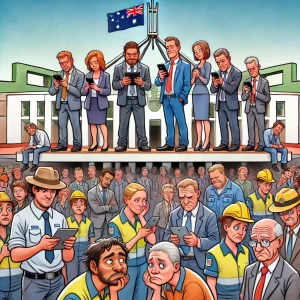In the wake of the recent Voice to Parliament referendum, a glaring contrast emerged between the voting patterns of the Australian Capital Territory (ACT) and the rest of Australia. While the nation as a whole voted approximately 60% against the proposal, the ACT stood apart, casting a clear 61% “Yes” majority vote. This is not the first instance of such divergence; similar patterns have been observed during general elections, where Canberra often leans more progressive than the national average. This discrepancy raises questions about whether the political and ideological leanings of the ACT are reflective of, or even suitable for, broader decision-making for the entire nation.

Privilege in the Capital
The ACT has long been viewed as a progressive enclave within Australia, frequently at odds with the majority opinion in other states and territories. This divide is not just political but also socio-economic. The ACT enjoys relatively high average incomes, low unemployment, and high levels of public funding, which contribute to a uniquely comfortable environment for its residents. Public spaces are pristine, infrastructure is state-of-the-art, and the majority of employment is secure, often government-backed work. The privilege that Canberra residents enjoy can lead to a skewed perspective on issues facing Australians who live outside the boundaries of this manicured capital.
For example, one could imagine an ACT public servant, perhaps named Felicity, who spends her days in a well-air-conditioned government office overlooking manicured parks and eco-friendly bike lanes. Felicity has her organic, locally-sourced lunch delivered directly to her desk while she contemplates the next public policy proposal that will undoubtedly impact people all across the country. Meanwhile, in regional towns, communities struggle with rising living costs, declining local services, and scarce employment opportunities. Felicity may sympathize in theory, but how could she truly understand?
The Voice Referendum: A Clear Divide
The referendum for the Indigenous Voice to Parliament exemplified this ideological split. While ACT voters decisively supported the “Yes” campaign, other states, including traditional swing states, decisively rejected it. The ACT’s progressive leanings, amplified by its socio-economic privilege, often sit out of step with much of the country. This gap in political will raises concerns that the so-called ‘Canberra thought bubble’ may create an echo chamber that fails to resonate with the broader Australian electorate.
Governance Risks
The perception that the ACT operates within a “thought bubble” is not new. Critics argue that the ACT’s policy inclinations reflect an insular view shaped by proximity to power and an academic approach to governance, rather than the pragmatic and diverse needs of the entire country. The risk here is that policies crafted in this bubble might serve the ideals of Canberra’s privileged class but fail to address the real concerns of a wider, more economically diverse Australia.
When policy decisions stem from the limited perspective of Canberra’s insulated community, they risk alienating the populations they’re meant to serve. Many Australians see Canberra’s policies as disconnected from their reality, whether it’s over-regulated industries in regional towns or escalating housing issues in the suburbs.
Imagine, for instance, a well-intentioned policy drafted by a public servant named Timothy, whose daily experience involves strolling through Canberra’s well-manicured parks, admiring local art installations, and conversing only with other policy advisors who share his worldviews. Timothy envisions a plan to ‘uplift regional communities’ through increased compliance measures—missing the reality that, in many places, these measures stifle local growth and deepen socio-economic divides. For Timothy, these are mere data points; for local businesses, they’re the difference between staying open and closing down.
Final Thoughts
The contrast between the ACT and the rest of Australia, illuminated most recently by the Voice referendum, underscores a growing awareness that political ideology in the capital often fails to mirror the broader national sentiment. While diversity in opinion can be a strength, it becomes problematic when a significant disconnect emerges between those who create and influence policies and those who live by them. If Canberra’s insular tendencies continue to shape national decision-making, it may prompt calls for greater checks to ensure that Australia’s governance reflects the views and realities of its entire populace, not just those within the borders of the capital.
The ACT’s perspective may be a fascinating study in governance, but it’s worth questioning if it’s a fit for national leadership. After all, can Felicity and Timothy really grasp the challenges faced by those beyond the comforts of the Canberra bubble?